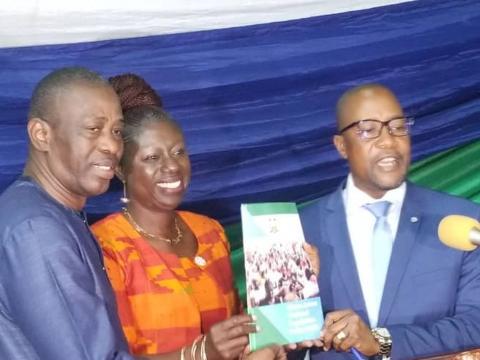By Hajaratu Kalokoh
The Ministry of Planning and Economic Development has launched a new National Population Policy which aims at controlling the fertility of women, as one of many strategies to deal with the country’s rapid population growth.
According to the latest (2015) national census, Sierra Leone’s population is around 7.3 million. Some 52% of this are women. This new population Policy targets women’s fertility as a key strategy in population growth management in line with the country’s economic growth.
Among others, it seeks to address reproductive health and rights issues, reduce adolescent pregnancy, build women’s empowerment, achieving education for all, and reduce mortality rates, all of which is geared towards helping the country realizes the demography dividend that is needed to accelerate sustainable socio-economic growth and development.
According to the Multiple Indicator Cluster Survey (MIC) 2017, the total fertility rate for Sierra Leone was 4.1 births per 1000 women aged 15-49.This represents a decline from 6.5% in 2008.
The United Nations Population Fund projections show that by 2050 Sub Saharan Africa will contribute more than half of the world’s population. Of the 2.2 billion people that will form part of the new population of the world, 1.3 billion will be from Sub Sahara Africa.
Robert Chakanda, Deputy Minister of Planning and Economic Development, explained during the launch of the policy on Thursday that the document will seek to address critical population management and development issues.
“It will look at demographic dividend, adolescent pregnancy issues, education for all, women’s empowerment, reproductive health and rights, and managing environmental vulnerabilities,” he stated at the event held at the Miata Conference Center in Freetown.
He noted that to deal with fertility, government will look at a range of social programs that will give women more reproductive rights.
“With this in focus, government commits to expand rights of women to make decision about their own reproductive cycle with the aim of gender equality in our society,” Dr Chakandas said.
Sierra Leone’s population growth has caused a lot of strain on social infrastructures like housing and water. This has caused poverty and, in some cases, worsen it.
Professor Osman Sankoh, Statistician General and Chief Executive Officer of Statistic Sierra Leone, said it is necessary for government to think about the kind of population it wants, noting that development has to be planned in line with population data.
“The policy that has been laid is grounded on sound data and it is equally without doubt that to measure progress overtime with all the indicators this policy has set will require credible data,” he said.
The national population policy document was developed with technical and financial support from the United Nations Population Fund (UNFPA).
Country Representative of UNFPA, Dr. Kim Eva Dickson, expressed delight at the launch.
“I am pleased that reproductive health and rights is a priority area in this National Population Policy,” she said.
She added: “UNFPA continues to work closely with the Government to strengthen partnerships to provide sexual and reproductive health and family planning services; strengthen supply chain systems; and build capacity for the delivery of rights-based family planning services to address the persistent challenges and barriers that exist.”
Minister of Information and Communications, Mohamed Rahman Swaray, officially launched the policy on behalf of Vice President Mohamed Juldeh Jalloh,
Swaray said the event represented the government’s commitment to meeting the needs of its citizens.
“By launching our Population Policy today, our Government reiterates its commitment to improve the quality of life through the following: addressing population dynamics; enhancing the reproductive health and rights of all Sierra Leoneans; fast-tracking socio-economic growth and human capital in line with projected population growth; strengthening national capacity of relevant institutions to carry out appropriate evidence- based on population planning and management,” he said.
© 2019 Politico Online









